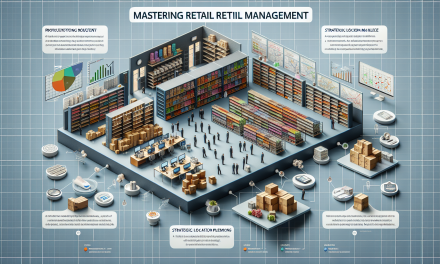Table of Contents
- Understanding Advanced Procurement Strategies
- Key Components of Effective Warehousing
- Logistics Management Essentials
- The Role of Technology in Procurement and Warehousing
- Advanced Techniques and Strategies
- Challenges and Solutions in Procurement and Logistics
- Frequently Asked Questions
- Conclusion
Understanding Advanced Procurement Strategies
In today’s dynamic business landscape, organizations need to leverage advanced procurement strategies to stay competitive. These approaches not only optimize the supply chain but also enhance overall operational efficiency. One way to gain a strong understanding of such strategies is through resources like the Advanced Procurement & Warehouse Management Course, which delves into contemporary methods for managing procurement processes effectively.
Defining Advanced Procurement
Advanced procurement can be defined as a strategic process aimed at acquiring goods and services in a way that minimizes costs while maximizing value. By employing techniques such as strategic sourcing, organizations can evaluate suppliers thoroughly and negotiate contracts that benefit their bottom line.
Importance of Strategic Sourcing
Strategic sourcing plays a vital role in advanced procurement. It shifts the focus from transactional purchasing to a more holistic approach that emphasizes supplier relationships and total cost of ownership. By considering factors such as supplier reliability, quality of goods, and delivery timelines, businesses can make informed decisions that drive long-term benefits.
Key Components of Effective Warehousing
Effective warehousing is crucial for ensuring that products are stored, managed, and delivered efficiently. To achieve this, several key components must be considered:
Warehouse Layout and Design
The layout of a warehouse should optimize movement and storage. An efficient design minimizes travel time for staff and enhances productivity. Companies often use various configurations, such as FIFO (First In, First Out) or LIFO (Last In, First Out), to streamline operations.
Storage Solutions
Choosing the right storage system can significantly impact warehousing efficiency. Options include pallet racking, shelving, and automated storage and retrieval systems (AS/RS), depending on the nature of the inventory. Effective storage solutions help in managing space utilization and ensure inventory is easily accessible.
Inventory Management Techniques
Effective inventory management techniques are essential for reducing overhead costs and preventing stockouts. Utilizing tools such as barcode scanning and RFID technology can enhance tracking efficiency. Additionally, businesses can benefit from software solutions that automate inventory processes, ensuring that stock levels remain accurate and up-to-date.
Logistics Management Essentials
Logistics management is the backbone of any successful supply chain. Companies must focus on optimizing logistics management to ensure timely and cost-effective delivery of products.
Transportation Management
Transportation is a significant element of logistics management. Organizations must assess whether to use in-house transportation or third-party logistics (3PL) providers. Furthermore, selecting the right mode of transportation—road, rail, air, or sea—depends on factors such as delivery speed, cost, and the nature of the goods.
Last-Mile Delivery Solutions
Last-mile delivery can often present logistical challenges. Businesses must evaluate various approaches, such as utilizing local carriers or leveraging technology solutions like route optimization software, to enhance last-mile efficiency.
Demand Forecasting
Demand forecasting can significantly influence logistics effectiveness. By analyzing historical data and market trends, companies can predict product demand and adjust their logistics strategies accordingly. Accurate forecasting not only reduces excess inventory but also improves customer satisfaction by ensuring that products are available when needed.
The Role of Technology in Procurement and Warehousing
Investing in technology is crucial for modern procurement and warehousing management. Technology streamlines processes, improves accuracy, and enhances overall efficiency. Here are some technologies that play a significant role:
Cloud-based Software
Cloud-based software offers flexibility and scalability for procurement and warehousing operations. These systems facilitate real-time data sharing, enabling teams to collaborate effectively irrespective of their geographical locations.
Big Data Analytics
Using big data analytics allows organizations to gather and analyze vast amounts of supply chain data. The insights gained can optimize various processes, from procurement to inventory management. For instance, businesses can refine their strategies by unlocking the potential of data with big data analytics for supply chain optimization.
Artificial Intelligence and Machine Learning
AI and Machine Learning can significantly enhance procurement strategies by aiding in supplier selection and risk assessment. Furthermore, these technologies can automate routine tasks, allowing teams to focus on higher-value activities.
Advanced Techniques and Strategies
With the ever-evolving landscape of procurement and logistics, adopting advanced techniques can make a substantial difference in operational success. Here are some techniques to consider:
Lean Inventory Management
Lean inventory management aims to minimize waste and reduce holding costs. By focusing on just-in-time inventory practices, organizations can reduce excess stock while ensuring that they have enough products to meet customer demand.
Supplier Relationship Management (SRM)
Developing strong relationships with suppliers can yield significant benefits. SRM enables businesses to collaborate with suppliers for mutual growth, fostering innovation and ensuring that supply chain risks are managed more effectively.
Challenges and Solutions in Procurement and Logistics
While advanced procurement strategies and logistics management offer numerous benefits, organizations must also be prepared to face several challenges:
Global Supply Chain Disruptions
Global events can disrupt supply chains significantly. Companies must develop contingency plans and diversify their supplier base to mitigate risks associated with disruptions. Diversifying suppliers ensures that businesses are not overly reliant on a single source.
Technological Integration Issues
Integrating new technology into existing systems can pose challenges. Organizations should ensure that they provide adequate training for employees and adopt a phased approach to implementation. This approach helps to minimize disruptions and facilitates smoother transitions.
Regulatory Compliance
Regulatory compliance remains a concern in procurement and logistics. Staying updated on laws and regulations, such as environmental regulations and trade agreements, is crucial. Leveraging compliance software can aid organizations in meeting regulatory requirements efficiently.
Frequently Asked Questions
What are advanced procurement strategies?
Advanced procurement strategies involve comprehensive methods and techniques aimed at optimizing the purchasing process, reducing costs, and maximizing value. These strategies include strategic sourcing, supplier relationship management, and lean inventory practices.
How can technology enhance logistics management?
Technology enhances logistics management by automation, optimizing transportation routes, and utilizing data analytics for informed decision-making. Leveraging cloud-based solutions and AI-driven tools also improves efficiency and real-time tracking.
Conclusion
In conclusion, advanced procurement strategies, effective warehousing, and efficient logistics management are vital components for any organization seeking to improve its supply chain operations. By embracing technology, optimizing processes, and fostering supplier relationships, businesses can navigate the complexities of today’s marketplace. To delve deeper into these concepts and enhance your skills, consider exploring further resources such as Mastering Strategic Supply Chain Management, Exploring Cutting-Edge Methods for Logistics Processing and Inventory Management, Mastering Oracle Inventory Management, and Mastering Advanced Purchasing Management.





